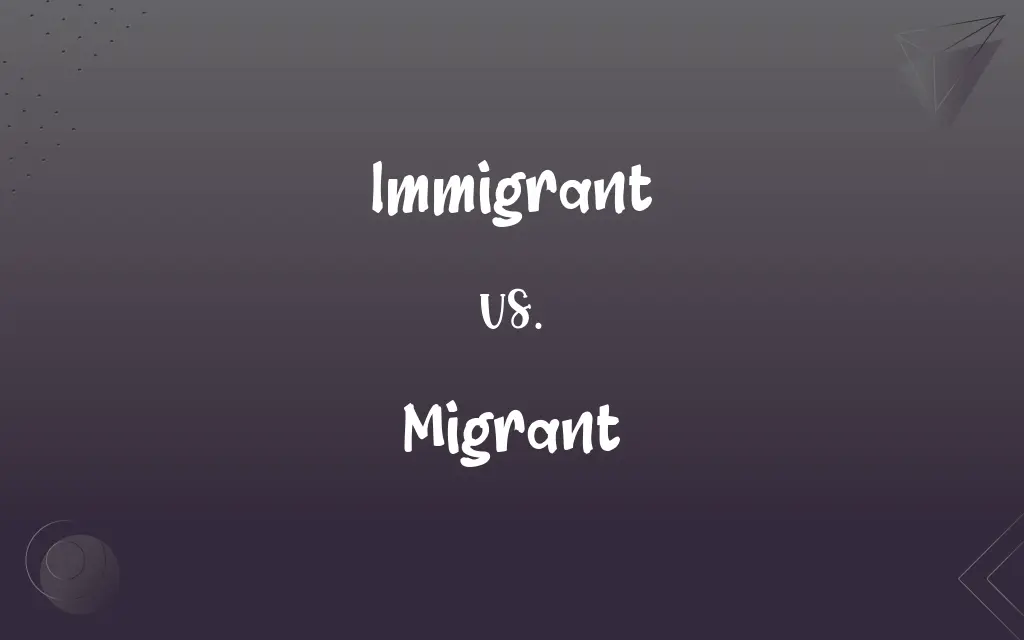Immigrant vs. Migrant: What's the Difference?
Edited by Janet White || By Harlon Moss || Updated on October 7, 2023
An immigrant moves to another country intending to reside there permanently. A migrant may move across borders, but without a permanent stay intent, often driven by work, seasons, or temporary situations.

Key Differences
Immigrants typically move from one country to another with the intention of establishing a permanent or semi-permanent residence in the new location. The motivation behind immigration can stem from a variety of factors, including the pursuit of better economic opportunities, escaping conflict or persecution, or reuniting with family members.
Migrants might also move from one country to another, but this movement can be seasonal or temporary. For example, a person might migrate to find temporary work or to escape harsh weather conditions but does not intend to establish permanent residency in the new location.
The term immigrant implies a level of permanence in the move, reflecting a decision to build a new, ongoing life in the destination country. Immigrants often undergo a legal process to establish permanent residency, potentially leading to citizenship.
In contrast, migrants might move for seasonal work, and their movement might not always lead to legal permanent residency. Migrants might return to their home country once the purpose of the migration (like a job or safety during a conflict) is resolved.
Legal implications also differ; immigrants often face processes and policies centered around obtaining legal status in the destination country, potentially involving pathways to citizenship. This may involve extensive legal processes and documentation.
ADVERTISEMENT
For migrants, the legal and social systems they encounter may focus on temporary statuses, as their stay is often not intended to be permanent. This might involve different types of visas, such as work or tourist visas, and does not typically lead to citizenship.
Comparison Chart
Intent of Stay
Permanent
Temporary/Seasonal
Legal Process
Aims for residency/citizenship
Might not seek residency
Duration of Stay
Long-term/Indefinite
Short-term/Defined
Primary Motivation
Establishing new life
Work, safety, or other short-term needs
ADVERTISEMENT
Legal Status
Often pursues permanent status
May retain original citizenship
Immigrant and Migrant Definitions
Immigrant
An immigrant can also move to join family members in another country.
Maria is an immigrant who moved to the U.S. to be with her siblings.
Migrant
Migrants might relocate temporarily due to environmental factors.
The migrant family moves south each winter to avoid harsh conditions.
Immigrant
Immigrants typically undergo legal processes to reside in a new country.
The immigrant worked diligently to fulfill all visa requirements.
Migrant
Migrants can be individuals who seek temporary refuge from conflicts.
The migrant found shelter in a neighboring country during the war.
Immigrant
Immigrants often relocate to seek better living conditions.
The immigrant family chose Canada for its strong healthcare system.
Migrant
Migrants may not necessarily seek permanent residency in a new place.
The migrant enjoys experiencing different cultures while working abroad.
Immigrant
Immigrants might move to escape adversity or persecution.
The immigrant journalist fled his country due to threats against his work.
Migrant
Migrants often move between their home country and elsewhere.
The migrant spends summers working in the U.S. and winters in Mexico.
Immigrant
An immigrant is a person who moves to another country permanently.
My neighbor is an immigrant from Italy, and she has lived here for 20 years.
Migrant
A migrant is a person who moves from place to place, often for work.
The migrant worker travels annually to harvest seasonal crops.
Immigrant
A person who leaves one country to settle permanently in another.
Migrant
An organism, especially an animal, that moves from one region to another (as for breeding) or that has established itself in an area where it previously did not exist.
Immigrant
An organism that establishes itself in an area where it previously did not exist.
Migrant
An itinerant worker who travels from one area to another in search of work.
Migrant
A person who leaves one country to settle permanently in another; an immigrant.
FAQs
What is an immigrant?
An immigrant is a person who moves to another country intending to live there permanently.
Can "immigrant" be used as an adjective?
No, when used as an adjective, it becomes "immigrant" as in "immigrant population".
What’s the origin of the word "immigrant"?
"Immigrant" originates from the Latin word "immigrare," which means to go into.
Is "immigrant" a noun?
Yes, "immigrant" is a noun.
What is the opposite of "immigrant"?
The opposite of "immigrant" is "emigrant".
Can an immigrant be a refugee?
Yes, a refugee is a type of immigrant, but they migrate specifically to escape danger.
What is a first-generation immigrant?
A first-generation immigrant is a person who has moved to a new country from their country of origin.
What is a migrant?
A migrant is a person who moves from one place to another, typically for work or other temporary purposes.
What is the primary difference between a migrant and an immigrant?
A migrant may move temporarily, while an immigrant intends to settle permanently.
Can a migrant seek permanent residence?
Yes, some migrants may seek to become immigrants by choosing to reside permanently.
How is "migrant" used in a sentence?
"The migrant birds return to this area every spring."
Can a tourist be considered a migrant?
No, tourists are not considered migrants, as their purpose and duration of stay are different.
What is the origin of the word "migrant"?
"Migrant" derives from the Latin word "migrare," which means to move from place to place.
What is the adjective form related to "immigrant"?
The adjective form is "immigrant," as in "immigrant families".
Is "migrant" also a noun?
Yes, "migrant" is a noun.
Can "migrant" be an adjective?
Yes, "migrant" can also be used as an adjective, as in "migrant workers".
What is a “migrant worker”?
A migrant worker is a person who moves from one place to another to find employment.
Does a migrant always cross international borders?
No, migrants can move within their own country (internal migration) or across international borders.
Is an immigrant always a citizen of the new country?
No, an immigrant isn’t necessarily a citizen and may need to undergo a legal process to become one.
What is an example of "immigrant" in a sentence?
"My grandmother was an immigrant from Italy."
About Author
Written by
Harlon MossHarlon is a seasoned quality moderator and accomplished content writer for Difference Wiki. An alumnus of the prestigious University of California, he earned his degree in Computer Science. Leveraging his academic background, Harlon brings a meticulous and informed perspective to his work, ensuring content accuracy and excellence.
Edited by
Janet WhiteJanet White has been an esteemed writer and blogger for Difference Wiki. Holding a Master's degree in Science and Medical Journalism from the prestigious Boston University, she has consistently demonstrated her expertise and passion for her field. When she's not immersed in her work, Janet relishes her time exercising, delving into a good book, and cherishing moments with friends and family.
































































